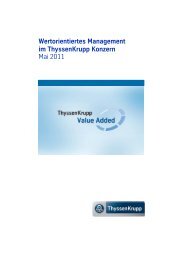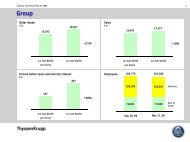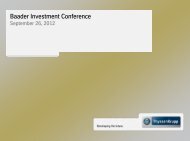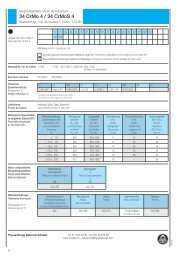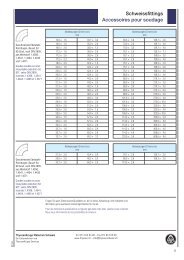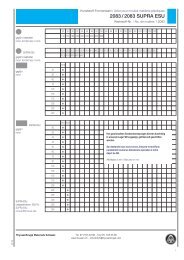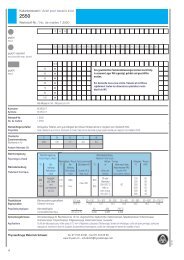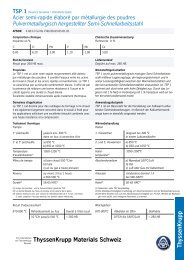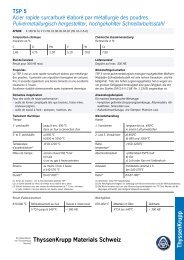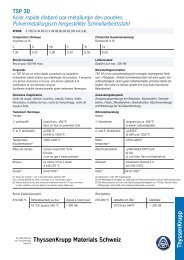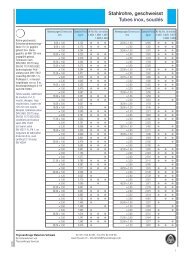Financial Statements and Management Report - Thyssenkrupp
Financial Statements and Management Report - Thyssenkrupp
Financial Statements and Management Report - Thyssenkrupp
You also want an ePaper? Increase the reach of your titles
YUMPU automatically turns print PDFs into web optimized ePapers that Google loves.
1.6 <strong>Management</strong> report Expected developments <strong>and</strong> associated opportunities <strong>and</strong> risks<br />
<strong>Financial</strong> risks<br />
Central responsibilities of ThyssenKrupp AG as parent company include the coordination <strong>and</strong> management<br />
of financial requirements within the Group <strong>and</strong> securing the financial independence of the Company as a<br />
whole. To this end we optimize Group financing <strong>and</strong> limit the financial risks. Risks in the individual financial<br />
risk areas are minimized through an ongoing process of monitoring <strong>and</strong> intensive controls.<br />
Credit risk (default risk): We enter into financial instrument transactions in the financing area only with<br />
counterparties who have a very high credit st<strong>and</strong>ing <strong>and</strong>/or are covered by a deposit guarantee fund.<br />
Transactions are concluded only within specified counterparty risk limits. Outst<strong>and</strong>ing receivables <strong>and</strong><br />
default risks in connection with supplies <strong>and</strong> services are constantly monitored by the Group companies; in<br />
some cases they are additionally insured under commercial credit policies. The credit st<strong>and</strong>ing of key<br />
account customers is monitored particularly closely.<br />
Liquidity risk: To secure the solvency <strong>and</strong> financial flexibility of the Group at all times, we maintain longterm<br />
credit facilities <strong>and</strong> cash funds on the basis of a multi-year financial planning system <strong>and</strong> a liquidity<br />
planning system on a rolling monthly basis. The cash pooling system <strong>and</strong> external financings are<br />
concentrated mainly on ThyssenKrupp AG <strong>and</strong> specific financing companies. We use the cash pooling<br />
system to allocate resources to Group companies internally according to requirements.<br />
Market risk: Various measures are used to mitigate or eliminate the risk of fluctuations in the fair values or<br />
future cash flows from non-derivative or derivative financial instruments due to market changes. These<br />
mainly include off-exchange-traded foreign currency forward contracts, interest-rate swaps, interestrate/foreign<br />
currency derivatives <strong>and</strong> commodity forward contracts with banks <strong>and</strong> commercial partners. To<br />
hedge against commodity price risks we also use exchange-traded futures. The use of derivative financial<br />
instruments is extensively monitored, with checks being carried out on the basis of policies in the framework<br />
of regular reporting.<br />
Currency risk: To contain the risks of our numerous payment flows in different currencies – in particular in<br />
US dollars – we have developed Groupwide policies for foreign currency management. All companies of the<br />
Group are required to hedge foreign currency positions at the time of their inception; companies based in the<br />
euro zone hedge via our central clearing office. Translation risks arising from the conversion of foreign<br />
currency positions are generally not hedged.<br />
Interest rate risk: To cover our capital requirements, we procured funds on the international money <strong>and</strong><br />
capital markets in different currencies <strong>and</strong> with various maturities. The resulting financial liabilities <strong>and</strong> our<br />
financial investments are partially exposed to risks from changing interest rates. To manage these risks,<br />
regular interest rate risk analyses are prepared, the results of which feed into our risk management system.<br />
Order risks<br />
Cost overruns <strong>and</strong>/or schedule delays can occur in the h<strong>and</strong>ling of major orders. We counter these risks by<br />
deploying experienced project managers <strong>and</strong> continuously improving our management instruments. We<br />
select our customers carefully <strong>and</strong> minimize the risk of default by collecting progress payments.<br />
15




